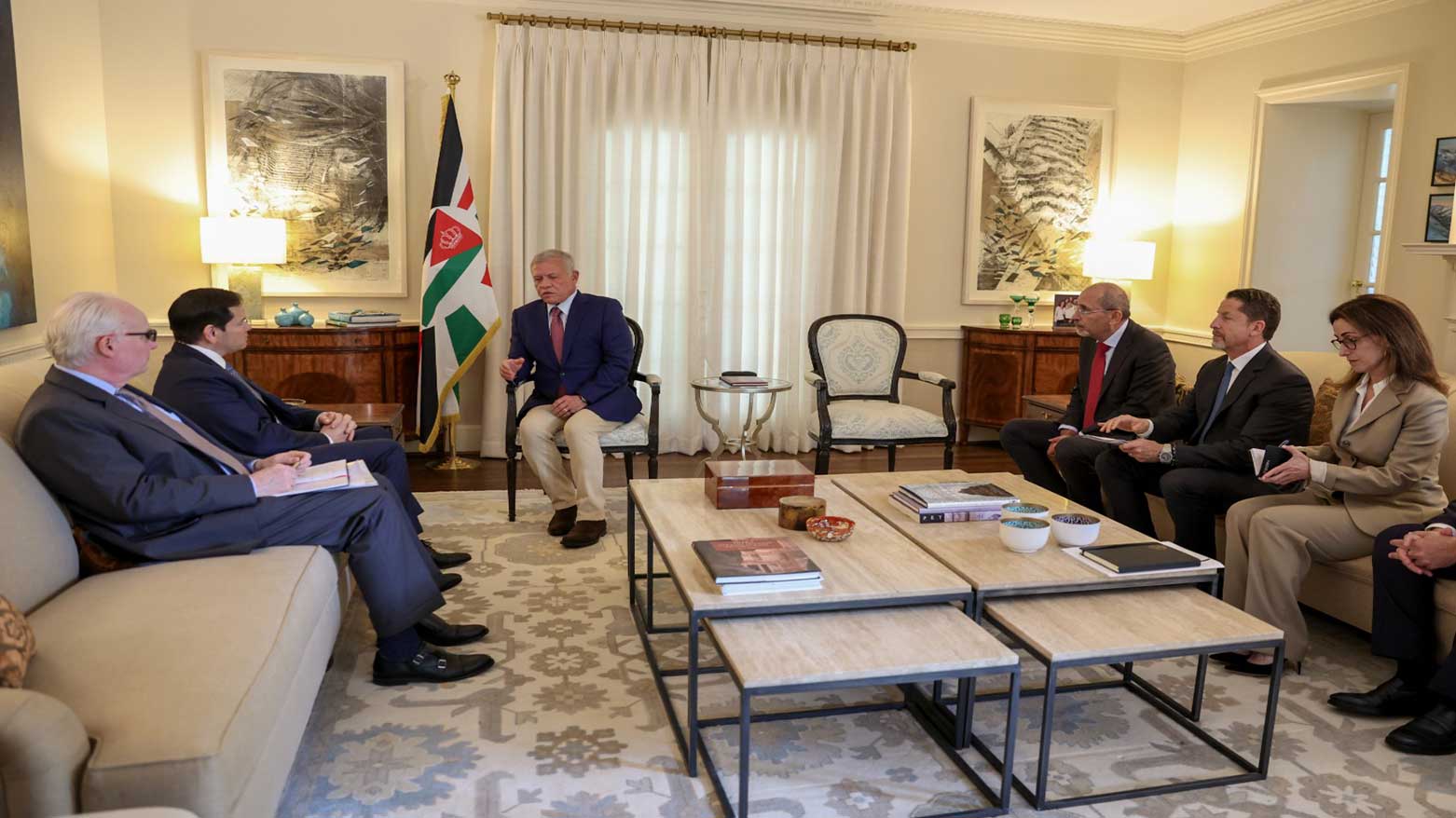Jordan’s King Abdullah Meets U.S. Secretary of State
The Kurdistan Region is very much part of the bloc of Middle Eastern states, including Jordan, with which the U.S. is strengthening ties.

WASHINGTON DC, United States (Kurdistan 24) — Jordan’s King Abdullah II met in Washington DC with U.S. Secretary of State Marco Rubio on Monday.
The event marked the second visit that Abdullah has made to Washington during Donald Trump’s second term. His first trip took place soon after Trump took office, during which the two leaders met on Feb. 11.
Their meeting appeared generally cordial, but Abdullah did publicly dispute the highly controversial proposal that Trump had made then (and has since dropped) to transform Gaza into a beachfront resort.
Read More: Jordan Rejects Trump Proposal to move Palestinians from Gaza, as Renewed Conflict Looms
Subsequently, Dr. Jafar Hassan, Jordan’s Prime Minister and Defense Minister, visited Washington and met with Rubio on April 16.
Read More: Rubio Meets with Jordanian Prime Minister, as US Contacts with Middle East Allies Continue
Evidently, that meeting was preparatory to Monday’s meeting between Rubio and the Jordanian leader.
Jordan is a long-time U.S. ally. Rubio and King Abdullah “discussed bilateral and regional issues, including the situation in Gaza, as well as developments in the West Bank and Syria,” according to the U.S. read-out of their meeting.
Rubio “emphasized the United States’ continued interest in working together on counterterrorism and expressed appreciation for Jordan’s cooperation in advancing regional security, stability, and prosperity,” it continued.
The Jordanian read-out was similar. “The meeting covered the strategic partnership between Jordan and the U.S. and ways to enhance cooperation in various sectors,” it began, as it noted “the pivotal role of the U.S. in promoting regional stability.”
But the Jordanian read-out also made clear Abdullah’s support for the Palestinians in Gaza and in the West Bank.
“His Majesty called for an immediate ceasefire” in Gaza, it said and “resuming aid flow to the Strip.” Regarding the West Bank, Abdullah “warned of the dangers of unilateral measures against the Palestinians, and violations of Muslim and Christian holy sites in Jerusalem.”
Abdullah “stressed the importance of creating a political horizon to achieve a just and comprehensive peace on the basis of the two-state solution,” the Jordanian read-out stated.
Bigger Context: Trump’s Visit to Gulf States
Trump will visit Saudi Arabia next week. It was to be his first trip abroad—just as his first trip abroad in his first term was Saudi Arabia. But that changed with the death of Pope Francis and his funeral last week, which brought Trump to Rome instead.
Trump will arrive in Saudi Arabia on May 13, according to Axios magazine, before traveling on to Qatar and the United Arab Emirates (UAE.)
Over the past month, there have been a spate of high-level contacts between the U.S. and its Middle East allies, of which the meetings with Jordanian officials are a part.
They include the visit of Egypt’s Foreign Minister to Washington and his meeting with Rubio on Feb. 10.
Read More: Egyptian Foreign Minister visits Washington, as Israel-Hamas Ceasefire Appears on Verge of Collapse
On Apr. 8, U.S. Secretary of Defense Pete Hegseth spoke on the phone with his Egyptian counterpart.
On Apr. 9, Saudi Foreign Minister Prince Faisal bin Farhan Al-Saud visited Washington and met with Rubio.
On Apr. 10, the U.S. Deputy Secretary of State Christopher Landau met with the Secretary General of the Gulf Cooperation Council, Jasem Al Budaiwi.
Read More: US Holds Series of Meetings with Arab Allies Ahead of Meeting with Iranians
And the following day, on Apr. 11, Rubio spoke with Masrour Barzani, Prime Minister of the Kurdistan Region.
Read More: PM Barzani and United States Reaffirm Strategic Ties
Thus, Rubio’s discussion with Barzani appears to be part of a broader U.S. effort to strengthen relations with its regional allies.
At the time, that effort seemed to be tied to Trump’s “maximum pressure” campaign on Iran.
But it also appears now to relate to Trump’s upcoming trip to Saudi Arabia, Qatar, and the UAE.
The Kurdistan Region is, thus, very much part of the bloc of Middle Eastern states with which the U.S. is strengthening ties.
The Kurdish Prime Minister has held regular meetings with senior UAE officials, most recently on Feb. 12, when he attended the World Governments Summit in Dubai and met with the UAE President Sheikh Mohammed bin Zayed Al Nahyan.
Read More: KRG PM Masrour Barzani Heads to UAE for World Governments Summit
And ten days ago, on Apr.27, the President of the Kurdistan Region, Nechirvan Barzani, met with King Abdullah in Jordan.
Read More: Kurdistan Region President Meets King Abdullah II in Amman to Strengthen Ties